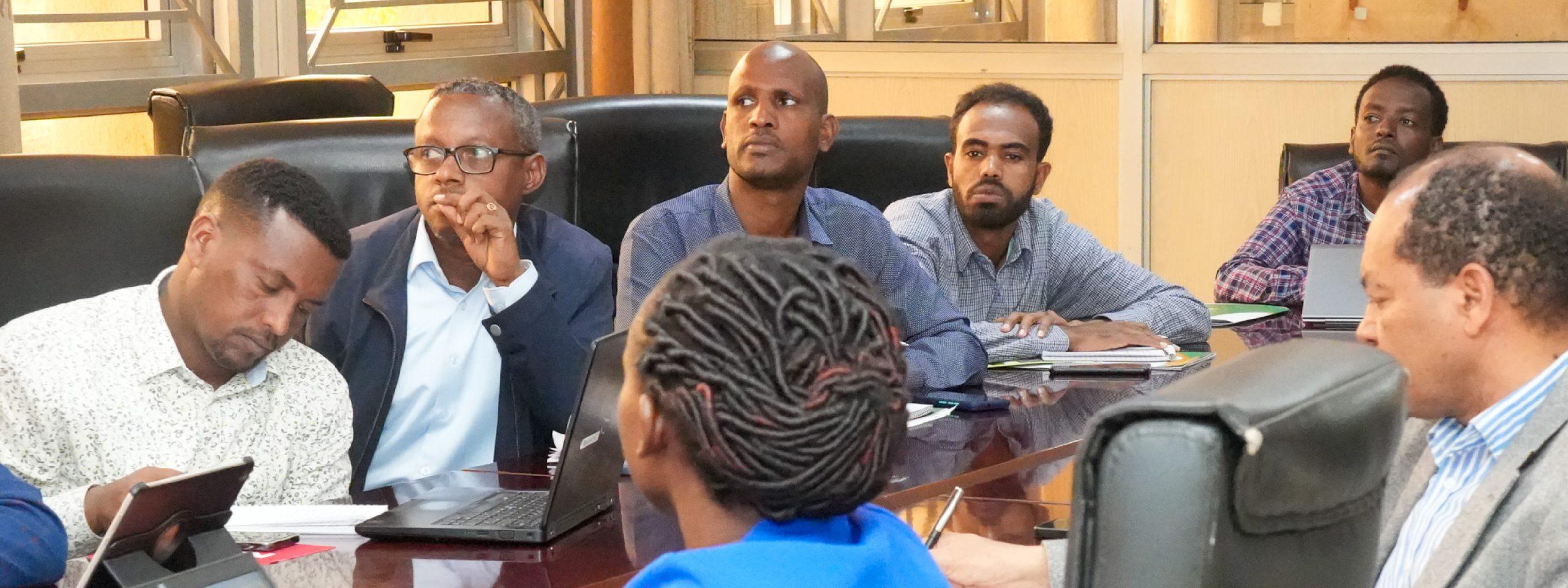February 15, 2024 (Kampala, Uganda): The Intergovernmental Authority on Development (IGAD) through its Land Governance Unit with the financial support from Geutsche Gesellschaft für Internationale Zusammenarbeit (GIZ) GMBH, completed the twinning exercise between the Ministry of Lands, Housing and Urban Development in Uganda and the Rural Land Administration and Use Directorate in the Ministry of Agriculture, Ethiopia in Kampala, #Uganda. The exercise was conducted from January 29th – February 14th 2024.
Ten Ethiopian land experts went through a comprehensive study tour on land administration and governance system in Uganda. The primary focus was to gain insights into Uganda’s Land Information System, existing legal and regulatory frameworks in land administration, systematic land demarcation and adjudication processes and explore the efficiency of a one-stop business center. While studying the LIS, Ethiopia’s experts also studied how Uganda keeps its rural and urban land records in the same system and operationalize a national land administration system. The main learning areas were:
- Understanding Legal and Regulatory Frameworks
- Exploring Institutional Arrangements
- Phased roll-out Strategies
- Digital information and service delivery
- Data communication infrastructures
- Online and digital recognition services
- Models on cost recovery and monetization methods
The Ethiopian delegation was thoroughly impressed by the robust and technologically advanced Land Information System in place that is interoperable with physical planning, land administration, land valuation, Surveys and Mapping and land registration. It was also interesting to note how the system facilitates streamlined access to critical land data, integration of land records with the National ID and the Taxation (Uganda Revenue Authority). The emphasis on transparency and efficiency within the Uganda Land Information System significantly stood out, offering valuable lessons for land management practices in Ethiopia. Equally enlightening was the study of systematic land demarcation and adjudication processes in the districts of Oyam, and Apac in Northen Uganda, where there is an ongoing process of systematic demarcation of customary land by government for mass titling to secure tenure land rights of the citizen. The delegates observed the meticulous approaches taken by Ugandan authorities in resolving land-related issues, ensuring fair and just distribution of land rights. The use of modern technology (SLAAC Data Capture and Processing Tool) and community engagement strategies showcased a model worth emulating to enhance land administration system in Ethiopia. The study tour to Uganda has been a transformative experience for the participants. The wealth of knowledge gained from exploring the Land Information System and witnessing the successful integration of agriculture with conservation practices will undoubtedly shape future policies and practices in Ethiopia. The collaborative spirit demonstrated by Ugandan Technical team has left an indelible mark on the Ethiopian delegation, fostering a sense of shared purpose and mutual learning in the pursuit of sustainable and efficient land management in both countries and beyond.
As the first twining exercises came to an end, a joint reflection and closing workshop was organized to consolidate the learning and deepen the relationship between the two countries. During the closing session, Mr Tigistu GebreMeskel, Chief Executive Officer, Rural Land Administration and Use Directorate in the Ministry of Agriculture, said that
‘We have gained practical knowledge and valuable experiences that will help us advance in our future activities in land administration, particularly in the enhancement of current National Land Administration Information System (NLIAS). It was an impactful study tour with several eye-opening experiences for us. We learnt that Uganda has made significant progress in digitization of land records and establishment of national land information system. Overall, our satisfaction was more than expected and our twinning experience in Uganda has achieved our learning objectives.’

